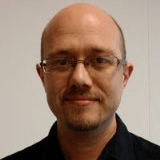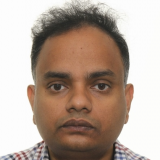Lu’s research focuses on simulating and assessing extreme hydrometeorological events like floods and heat waves, particularly in relation to climate change. Lu employs satellite remote sensing, environmental modelling, and machine learning to analyse urban and watershed contexts.
Prakash Kripakaran
Prakash is academic lead for the civil and structures research group at Exeter. His research interests are broadly in the design and management of civil infrastructures, such as bridges. He has significant experience in: the experimental and numerical modelling of flow and scour (erosion) around hydraulic structures such as bridge piers; the use of applied computing techniques including Building Information Modelling (BIM) for construction automation and design; the development of finite element modelling-based and data-driven strategies for interpreting measurements from bridge structural health monitoring; and the application of optimization methods for structural design problems (e.g. design of trusses and moment-resisting steel frames).
Peter Melville-Shreeve
Dr Peter Melville-Shreeve has worked in consultancy, startups and academic roles over the last decade. He works closely with the Chartered Institution of Water and Environmental Management’s (CIWEM’s) policy team to support sustainable water management systems and chair’s CIWEM’s Water Reuse Task & Finishing Group. Much of Peter’s early research focusses on rainwater management systems and the need for dual purpose designs – which can mitigate droughts and floods. His thesis highlighted the opportunities for Internet of Things technologies to be harnessed to reduce water demand AND manage stormwater flood risk. He consequently founded and exited a technology business which developed analytics and control systems to enable such technologies to be implemented at a range of scales.
Rich Crane
Rich’s key research and teaching areas are extractive metallurgy, materials science, nanotechnology and applied geochemistry for a range of applications including the development of novel mining techniques, mine site reclamation, waste treatment, water treatment and contaminant transport.
More information on Rich’s institutional profile
Raziyeh Farmani
Raziyeh specialises in urban water systems modelling, water resources management and asset management and has expertise in multi-objective optimisation of water networks. Her research interests covers evolutionary optimisation, artificial intelligence and data mining.
Slobodan Djordjevic
Slobodan researches the development and application of advanced methodologies and software tools for water management. These include: drainage and floods simulation, impacts of flooding, effects on human health and impacts on road transportation, resilience to diverse extreme weather events in the context of climate change, tidal energy extraction, water quality modelling, river and coastal engineering, water-food-energy nexus, cascading effects between water, waste, energy, transportation and other infrastructure systems, nature-based solutions, and drought risk management.
Albert Chen
Albert’s research focuses on water and human environment systems. Particular focus is on: hydraulic modelling, urban drainage, flood forecasting, innovation technology applications, water-food-energy-ecosystems nexus, climate change impact on critical infrastructure, prediction of water-borne disease, hazard impact and cascading effects assessment, and mitigation and resilience strategies.
Michael Singer
Michael’s research covers ecohydrology; drought and water scarcity; forest health; stochastic hydrology; climate change; floods; Sediment transport; hydrology and geomorphology.
Michaela Bray
Michaela specialises in numerical weather modelling; real-time flood forecasting (raingauge network analysis, real-time updating) as well as remote sensing and Geographic Information System; climate change hydroinformatic technologies.
Nick McCullen
Nick is interested in how the complex interactions between the various components, such as buildings, technology, the environment, and people, result in the energy consumption of the built environment.
Katerina Michaelides
Katerina’s research focuses on rainfall-driven processes at the Earth’s surface, including overland flow generation, sediment transport, erosion and biogeochemical fluxes with a specific focus on dryland basins where water and nutrients are greatly limited. Current projects include ‘Drought Resistance in East African Dryland Regions’ and ‘Re-work of Mobile Phone App Development for Drought Adaptation in Drylands’.
Thomas Kjeldsen
Thomas works on flood frequency, catchments, peak flow, urbanization, design flood, frequency analysis, climate and hydrology.
Sangaralingam Ahilan
Sangaralingam’s main interests are in sustainable urban flood risk management and the long-term performance of sustainable drainage systems, using detailed hydrological and hydro-morphodynamic modelling. He is also analysed SME behaviour in flooding aftermath.













